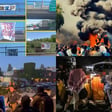
Episode 2: Peter Gelderloos and Prince Shakur
On this episode of The Beautiful Idea, with the second Trump administration only weeks away, we sit down to speak with two anarchist authors and thinkers, Peter Gelderloos and Prince Shakur.
Peter is the author of such classics as How Non-Violence Protects the State and Worshiping Power, and also has recently published two new books, They Will Beat the Memory Out of Us and Organization, Continuity, Community. Peter is also currently publishing on substack.
Prince Shakur is an organizer, author, and one of two hosts who run The Dugout, a Black anarchist podcast which you can check out here and follow on Instagram. Shakur is also the author of When They Tell You To Be Good.
During our episode we speak with both Peter and Prince about their thoughts on the coming Trump administration and how people involved in social movements and struggles should ready themselves and their communities. Is it fair to call Trump a fascist and what can we expect from the incoming administration? What cracks can we see forming within the ruling order going forward, and what opportunities and challenges do autonomous rebels face in this new terrain?




